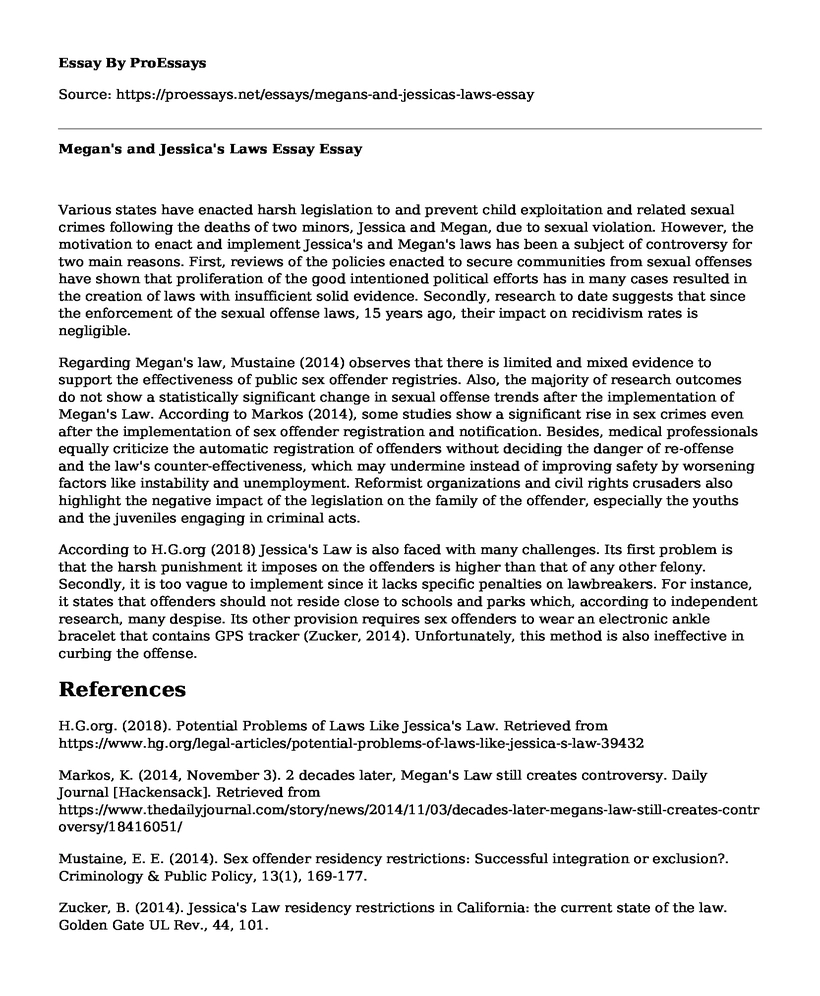Various states have enacted harsh legislation to and prevent child exploitation and related sexual crimes following the deaths of two minors, Jessica and Megan, due to sexual violation. However, the motivation to enact and implement Jessica's and Megan's laws has been a subject of controversy for two main reasons. First, reviews of the policies enacted to secure communities from sexual offenses have shown that proliferation of the good intentioned political efforts has in many cases resulted in the creation of laws with insufficient solid evidence. Secondly, research to date suggests that since the enforcement of the sexual offense laws, 15 years ago, their impact on recidivism rates is negligible.
Regarding Megan's law, Mustaine (2014) observes that there is limited and mixed evidence to support the effectiveness of public sex offender registries. Also, the majority of research outcomes do not show a statistically significant change in sexual offense trends after the implementation of Megan's Law. According to Markos (2014), some studies show a significant rise in sex crimes even after the implementation of sex offender registration and notification. Besides, medical professionals equally criticize the automatic registration of offenders without deciding the danger of re-offense and the law's counter-effectiveness, which may undermine instead of improving safety by worsening factors like instability and unemployment. Reformist organizations and civil rights crusaders also highlight the negative impact of the legislation on the family of the offender, especially the youths and the juveniles engaging in criminal acts.
According to H.G.org (2018) Jessica's Law is also faced with many challenges. Its first problem is that the harsh punishment it imposes on the offenders is higher than that of any other felony. Secondly, it is too vague to implement since it lacks specific penalties on lawbreakers. For instance, it states that offenders should not reside close to schools and parks which, according to independent research, many despise. Its other provision requires sex offenders to wear an electronic ankle bracelet that contains GPS tracker (Zucker, 2014). Unfortunately, this method is also ineffective in curbing the offense.
References
H.G.org. (2018). Potential Problems of Laws Like Jessica's Law. Retrieved from https://www.hg.org/legal-articles/potential-problems-of-laws-like-jessica-s-law-39432
Markos, K. (2014, November 3). 2 decades later, Megan's Law still creates controversy. Daily Journal [Hackensack]. Retrieved from https://www.thedailyjournal.com/story/news/2014/11/03/decades-later-megans-law-still-creates-controversy/18416051/
Mustaine, E. E. (2014). Sex offender residency restrictions: Successful integration or exclusion?. Criminology & Public Policy, 13(1), 169-177.
Zucker, B. (2014). Jessica's Law residency restrictions in California: the current state of the law. Golden Gate UL Rev., 44, 101.
Cite this page
Megan's and Jessica's Laws Essay. (2022, Jul 20). Retrieved from https://proessays.net/essays/megans-and-jessicas-laws-essay
If you are the original author of this essay and no longer wish to have it published on the ProEssays website, please click below to request its removal:
- The Eighteenth Amendment Essay Example
- Research Paper on Alcoholism and Employment
- Essay Sample on Use of Social Media to Investigate Crime
- Capital Punishment in the US - Essay Sample
- Paper Example on 14yo Overweight Patient: Holistic Health Care Plan
- Essay Example on U.S. Prisons Need a Change: Focus on Rehabilitation, Not Punishment
- Reevaluating Capital Punishment: Ineffectiveness and Moral Concerns in the Criminal Justice System







